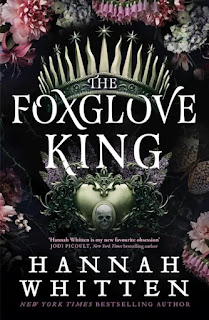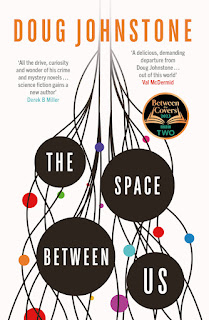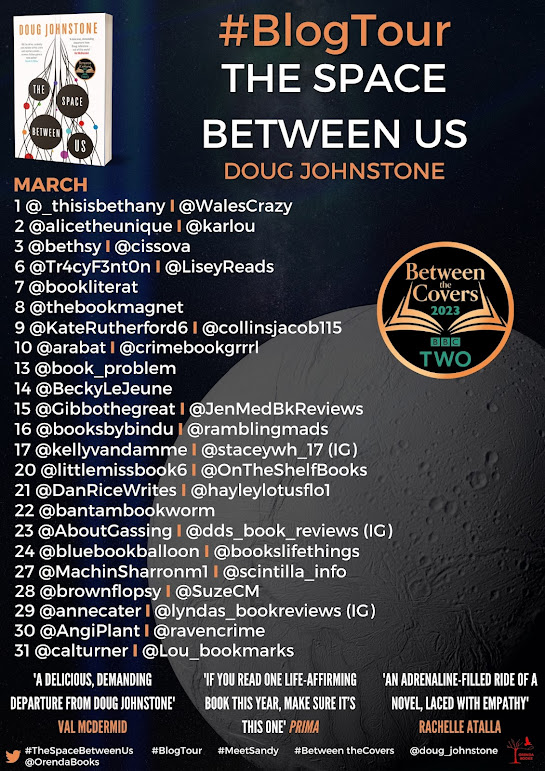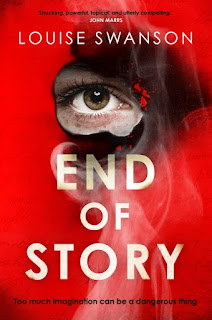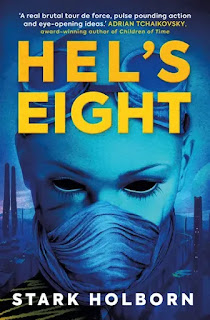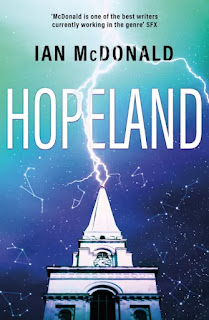I like talking about books, reading books, buying books, dusting books... er, just being with books.
Map of Blue Book Balloon
30 March 2023
#Review - Beyond the Reach of Earth by Ken MacLeod
28 March 2023
#Review - The Foxglove King by Hannah Whitten
Hannah Whitten
Orbit, 9 March 2023
Available as: HB, 466pp, audio, e
Source: Advance copy and audio subscription
ISBN(HB): 9780356521237
24 March 2023
#Blogtour #Review - The Space Between Us by Doug Johnstone
Doug Johnstone
Orenda Books, 2 March 2023
Available as: PB, 276pp, audio, e
Source: Advance copy
ISBN(PB): 9781914585449
23 March 2023
#Review - End of Story by Louise Swanson
Louise Swanson
Hodder & Stoughton, 23 March 2023
Available as: HB, 320pp, audio, e
Source: Advance copy
ISBN(HB): 9781529396102
21 March 2023
#Review - Hel's Eight by Stark Holborn
Source: Advance copy
ISBN(PB): 9781803362298
20 March 2023
#Review - Birthright by Charles Lambert
Charles Lambert
Belgravia Books, 23 March 2023
Available as: PB, 256pp, e
Source: Advance copy
ISBN(PB): 9781913547288
I'm grateful to the publisher for an advance copy of Birthright to read and consider for review.
Birthright is a twisty, wicked story, a story of identity, loss and yearning, and it's just brilliant.
Fiona is growing up to a privileged lifestyle in England. She has wealthy parents and an expensive boarding school - but also a feeling that something is just, well, off. She got on better with her father than her mother, and when he dies, resents her for ending the regular holidays in Italy during which she met handsome Lorenzo and his friends. Her mum's stuffy, Thatcher-worshiping friends repel Fiona (this is the late 70s/ early 80s) and a friend she makes at school shows her the delights of a chaotic household where feelings are accepted and spoken about.
Maddy, in contrast, has grown up in poverty (albeit the sort of hippyish, self-inflicted poverty adopted by rebellious children of privilege, fun until the money runs out). She has never known a father, her mother dallying with a series of men, some merely useless, others positively dangerous (there are some truly dark episodes described). Age, shortage of money and circumstance have left the two washed up in a grim flat in Rome, which is where Fiona becomes aware of Maddy - the two young women have an uncanny resemblance to one another.
When Fiona discovers this, she becomes Maddy's obsessive stalker, deeply, creepily jealous of the other girl and determined to prove a link between them, despite their very different backgrounds. That aspect of the story - kind of a detective mystery with a psychological twist - makes this an easy book to get into. Add in a handsome charmer - Fiona's jailbird boyfriend - and the romantic streets of Rome, and Lambert has produced a heady, painful but clinically well-observed story with plenty of twists and turns.
But there's more besides. Beneath the mystery of the two young women, a central theme here is envy, the sense that Fiona (but also, Maddy, to a degree) have that the other is luckier, happier, possessed of something they don't. One's sympathies ping pong between them. Fiona's clearly had a very chilly upbringing, but then, she is going to be very wealthy, she literally wants for nothing, so, one might think, she can at least be unhappy in comfort and will have time and space to sort out what she wants in life. Instead she determines that she will be Maddy's sister, and that that will make everything right for her.
If only. Maddy herself has a very complex relationship with her alcoholic mother, but still resents Fiona's restless, prowling attentions and doesn't want their not-so-perfect life turning upside down. The emotional temperature between Fiona and Maddy is high, the pages fairly crackling with electricity, with attempts at understanding, unreasonable expectations and some spectacular tantrums. Neither very likeable, the reader will I think come to understand and sympathise with both, wishing that they might find some way to accept one another's existence - or perhaps, to separate and get on with their separate lives.
But it seems they can do neither. I had to remember that despite both having, in different ways, an apparently sophistication in the ways of the world, they are both, really, very very young and the upbringing of neither has really been conducive to emotional maturity and understanding. You couldn't really imagine two women less suited to navigating the storms of longing and resentment that they find themselves in (not to speak of a complex romantic rivalry that develops).
That complexity was one of the things that for me made Birthright such an excellent read. The book has it all - brilliantly depicted characters, greater and greater tension and beautiful Roman atmosphere and settings (you will feel you are there!) (Also, smoking. Lots and lots of smoking. After all, it is set in the 70s and 80s.)
Best of all though, it really draws the reader in, putting her or him in Fiona's place, in Maddy's.
What would you do, you'll wonder? What would you want? How would I get out of this? Would I even try? Where will it all lead?
All in all, Birthright is a fantastic book, one I'd heartily recommend. Do give it a try.
For more information about Birthright, see the publisher's website here.
17 March 2023
#Review - The Magician's Daughter by HG Parry
HG Parry
Orbit, 2 March 2023
Available as: PB, 374pp, audio, e
Source: Advance copy
ISBN(PB): 9780356520315
15 March 2023
#Review - Hopeland by Ian McDonald
Ian McDonald
Gollancz, 16 February 2023
Available as: HB, 656 pp, audio (narr Esther Wane), e
Source: Advance copy
ISBN(HB): 9781399605731
13 March 2023
#Review - The Tyranny of Faith by Richard Swan
Richard Swan
Orbit, 16 February 2023
Available as: HB(546pp), audio, e
Source: Advance copy
ISBN(HB): 9780356516431
I'm grateful to Orbit for an advance copy of The Tyranny of Faith to consider for review.
The Tyranny of Faith sees a welcome return for itinerant Justice Sir Konrad Vonvalt and his retainers, Bressinger, Sir Radomir and, of course, the wonderful Helena Sedanka. In an Empire abounding in plots, treason and - as become clear in The Justice of Kings - forbidden Magicks - the team must try to uphold the rule of law while all around seem, rather, to be playing the rules for their own ends.
The story is, then, very much a continuation of the earlier book, though with the setting established we move much closer to the centre of things - first when Sir Konrad takes the team to the capital, Sova, in an attempt to warn the Emperor that something is wrong, and then to the debatable lands on the southern border with a mission from the Emperor (the warning more or less disregarded).
I don't want to drop any spoilers, but we do know from the start - because Helena, writing this account decades later, tells us - that dark times are ahead for the Empire of the Wolf so it's clear that, while there may be some success for Sir Konrad, greater forces are at work (or at least, their plans are too far advanced) for our heroes to halt.
But that doesn't take away the tension, far from it. Rather it left me desperate to know how exactly things will go to shit - there are so many ways it might happen! - and how everybody will measure up when they do. Because we also know that the crew are far from perfect as individuals. Helena has already realised Sir Konrad has feet of clay, and this book does more to expose how, under the Sovan Empire, the pursuit of realpolitik trumps equality before the law. Sir Radomir is, increasingly, a functioning alcoholic. Bressinger is devoted to Sir Konrad and will not act against him, not even to save him from himself. And Helena herself - well, as ever, she's impulsive, inexperienced and still young and she has so many feelings to cope with here, abut herself (remember the loss she suffered in The Justice of Kings), and her companions, especially Sir Konrad. (She is of course also brave, idealistic and determined - which she will need to be when various machinations land her in the front ranks of an army of fanatic warrior nuns marching to confront invaders...)
There's a fantastic interplay here between the characters. They are - just - still able to work as a team despite tensions and disagreements. The Tyranny of Faith is actually a wonderful depiction of colleagues under pressure doing their best in impossible circumstances. It's also a heartbreaking depiction of Helena's ongoing disillusion with Sir K (disillusion, not disengagement - the attraction between them is an opposite and more than equal force in Helena, and is acknowledged here more than it was in the previous book).
Indeed, the relationships are so well done - whether the four are getting drunk in a tavern, nursing their hangovers next morning, pursuing villains through bustling Sova, or fighting against impossible odds - that I would want to read about them whether or not they were central figures in a world shaking fantasy novel. I have been known at times to mutter at doorstep fantasy books to just get on with the plot - but not here. If Swan wanted to extend this series by a book or two just so we could see more of Sir K, Bressinger, Helena and Sir Radomir, that would be fine by me, absolutely fine.
Failing that perhaps we could have some short stories set in the quieter moments? Those might be hard to fit in, though, because as this book marches on, those quiet moments become fewer and further between. Faced with one shock after another, constrained by orders from the Emperor, Sir Konrad's authority and command of events become weaker and weaker, forcing him to adopt methods which leave Helena aghast. And still the crew are exposed to ever greater dangers, operating in unfamiliar country and against strange enemies, human and magickal. (One of the other strengths of this book is its use of the dangerous ancient "magicks" that seemed so domesticated and controlled in the hands of the Justices in The Justice of Kings. We learn a lot more about them here, and it's clear that not only have the Justices been playing with fire all along, but that now others want to play with it too...)
I do have an off-on relationship with fantasy, but have firmly placed Swan's series on my list of "Fantasy that I really like" and I hope you will too. Strongly recommended!
For more information about The Tyranny of Faith, see the publisher's website here.
9 March 2023
#Review - Nothing Special by Nicole Flattery
Nicole Flattery
Bloomsbury, 2 March 2023
Available as: HB, 240pp, e, audio
Source: Advance copy
ISBN(HB): 9781526612120
I'm grateful to the publisher for an advance copy of Nothing Special via Netgally.
Nothing Special is a hard book for me to review. I tend to review mainly plot or character driven books, which both provide relative easy ways into a review: you can describe what happens (without spoilers!) or you can talk about the people in the book (without spoilers!). Then you can get into the atmosphere, the way the book makes you feel and so on.
With Nothing Special I'm afraid that neither approach will work, which is frustrating because I want to persuade you to read this rich, fascinating story. Plot? Yes, things do happen here, but they're the comforting jumble of everyday life (for value of "everyday life" that fit New York in the late 60s). Fascinating, textured coming and goings but difficult to summarise. Characters? There are indeed well delineated characters. In particular, 17 year old Mae, our window into this world, is a blizzard of a character, full of desires, hopes and already (at that young age) regrets. Her mother, and her mother's boyfriend Mikey, are also richly layered and well observed. But Mae is also vastly contradictory, and she is telling the story of her teens from the perspective of some thirty years later, commenting on it with a great deal of knowingness both about herself and about the events which bring her - brought her - into the orbit, if the distant orbit, of 60s celebrity Andy Warhol.
I'm not sure I can do justice to that, especially as there are really two Maes in the book, the impulsive (but is she?) young woman and the more resigned, but also more understanding, older one. And as the younger Mae, at least, changes and develops rapidly in the hothouse environment of Warhol's Factory, where she comes to work (although here, it's always the 'studio').
Mae has, for example, an affect of rather chilly detachment from what she's witnessing, but it's hard to tell whether that is actually meant to be how the 17 year old saw things, or if it was a teenage pose, an attitude, a protection against what are pretty intense emotional ups and downs. Or it may be an artefact of the older woman recalling her youth? Once I started asking myself questions like that (another arises in relation to Mae's relationship with her mother (who seems pretty unpleasant) and her mother's boyfriend Mikey (generally derided, but he seems one of the more likeable characters here)) the book became almost a hunt for clues, every phrase, every comment turned over and examined. I cam to no conclusions. We are left to wonder, and it's fascinating to do that.
We're also left to wonder about the detail of what is happening - and about what we're not told. Before reading this book I knew very little about Warhol (apart from the Campbell soup cans, and "famous for fifteen minutes") so I wasn't aware of how much in the book to take as literal. (A bit of research afterwards suggested, quite a lot). But actually that's not the right question, I think. What's more important here than "what really happened?" is "what is Mae thinking and feeling?"
For example, she's been employed (though doesn't actually get paid much) for transcribing tapes that will be used as the basis for an experimental novel "by" Warhol. (Incidentally, he's not often named in the book, and when he is, it's with no upper case in his name - like many of the other characters, even Mae's "I" is lower case - except when he is called "Drella", a nickname used by his associates based on "Dracula" and "Cinderella". Make what you want of that.) The content of these tapes horrifies but fascinates Mae and her fellow typists, and their developing relationship with them is central to the book - but the content is never directly described, though it is implied that it is degrading, exploitative. I'm left wondering what I would find if I ever read "a: A Novel"(it has NO reviews own Amazon!)
Another example might be Mae's introduction to and relationship with Warhol's whole operation. Presented here, it's the result of a more or less random chain of events followup a casual hookup she has with a man she meets in a department store. (Early ion the book Mae spends a lot of time in department stores hoping to get picked up). One might be forgiven for thinking she thereforelittle idea where she's going when she turns up to be interviewed for the typing role by "anita" (lower case "a"). But in the succeeding weeks, Mae (and the other typists) seem to have a near obsession with Warhol's circle, some of whose leading personalities appear on those tapes, an obsession that reminded me of the attitude some people have today towards their favourite social media stars and influencers.
While it's perfectly plausible to see this as something that has developed in the hothouse atmosphere of the 'studio' (albeit the typists are corralled in a distant corner, overlooked by the artists, actors and socialites who seem to spent their time lounging around and smoking at the centre of things) I also wondered whether there wasn't something much more intentional in young Mae's involvement, a deliberateness to her penetration of this social circle, its parties and schisms which the older woman has tried to play down but not completely erased?
Similar mysteries abound, so that, while at one level you might indeed say that little actually happens in this book, that wouldn't really be true. You need, as I said above, to pay close attention, and you need to approach everything Mae (both of them!) says with caution, but when you do, you will see all sorts of stuff going on - both about Mae's own circumstances and her growth and coming of age, and encapsulations of wider society at a cultural and emotional crossroads.
I keep coming back, in thinking about this book, to the TV series "Mad Men", some of whose plot threads depict the same 60s New York avant-garde scene. Of course "Mad Men" does it from a different and more privileged perspective this demimonde is a place to be visited and explored... before getting back on the train to a comfortable suburb. It's starkly obvious that Mae doesn't have such a safety net and there is often a sense of danger, of edginess, to the things she gets up to which is heightened by our not being told just how much "young Mae" understands (and intends) that.
Older Mae doesn't elucidate for us here, leaving several different alternatives open from her teenage self deliberately exploring this world, to her falling into it accidentally but then aligning with it, to rather darker interpretations.
By the end of the story I almost had the sense of reading a choose-you-own-adventure story, but with all the switches and alternatives obscured so that it seemed like several stories at once. This was at times overwhelming and confusing but also, increasingly grippy, and deeply thought provoking.
Far from an easy read, but a very rewarding book, I think.
For more information about Nothing Special, see the Bloomsbury website here.
7 March 2023
#Blogtour #Review - Beautiful Shining People by Michael Grothaus
2 March 2023
#Review - Hob by David M Barnett
David M Barnett
Published by the author, 2022
Available as: e
Source: Purchased
ASIN: B0BPJRVXS1
1 March 2023
Cover Reveal - Orphan Planet by Rex Burke
Today I'm honoured to be joining in the cover reveal for Orphan Planet, the new novel from Rex Burke and first in the Odyssey Earth series.
About the Book
With Earth in crisis, humans are travelling deep into space. But humanity’s future just took a wrong turn.A seventeen-year colony-ship voyage – a straight shot to a new planet. Handpicked, single-minded crew, and a thousand settlers in hypersleep. No children, no families, no fuss.
That was the plan, anyway
Captain Juno Washington commands a ship of loners and oddballs. The teenagers of the Odyssey Earth didn’t ask to be born, and face an uncertain future. And Jordan Booth really didn’t want to be woken up early.
After an unexpected change of course, relationships are tested like never before. If they listen to advice, pull together and stop squabbling, they might just make it.
Yeah, right. Good luck with that.
Title: Orphan Planet (Odyssey Earth series, Book 10
KindleUnlimited, 18 April, 2023
Available as: e, 332pp, 70k words
Buy from: Amazon (pre-order from 1 March, 2023)
Rex Burke is a SciFi writer based in North Yorkshire, UK.
When he was young, he read every one of those yellow-jacketed Victor Gollancz hardbacks in his local library. He’s sure there are still thrilling SciFi adventures to be told – even if he has to write them himself.
 |
| Rex Burke |
Website: https://rexburke.wordpress.com
Contact: scifirex@icloud.com
Twitter: @SciFiRex
Publications
Odyssey Earth series
First Date (short story) – available now for free: https://subscribepage.io/GPiihl
Orphan Planet (Book 1) – 18 April, 2023
Twin Landing (Book 2) – July 2023
Star Bound (Book 3) – November 2023

